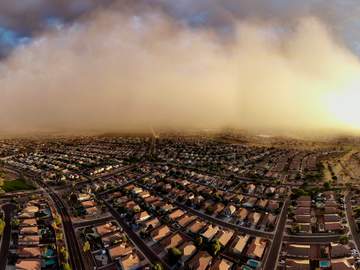
‘Haboob’
Some wild weather in the southwestern U.S. drove high lookups for haboob.
The Valley has finally been hit by its first truly big haboob of 2025. The massive dust storm began around Eloy and Arizona City southeast of the Phoenix area Monday afternoon, blowing its way through the southeast Valley on its way into town. The wall of dust, towering hundreds of feet above the ground and moving between 25-30 miles per hour, all but subsumed Queen Creek and Chandler as it pushed toward Phoenix.
—Zach Buchanan, The Phoenix (Arizona) New Times, 25 Aug. 2025
Coming from the Arabic word habūb, meaning “violent storm,” haboob refers in English to a violent dust storm or sandstorm. The word originally applied to such storms in Sudan, but has since expanded to cover similar storms in other desert regions.
‘Engaged’
Engaged enjoyed a swift rise to become one of the week’s chief lookups following news of a high-profile engagement.
It’s a love story and, baby, she said yes: Taylor Swift and Travis Kelce are engaged, they announced Tuesday. In a five-photo joint post on Instagram, the superstar singer and football player revealed their engagement, the fairytale culmination of a courtship that for two years has thrilled and fascinated millions around the world, but especially Swifties, the pop star’s enormous and ardent fan base.
—Jocelyn Noveck and Dave Skretta, The Associated Press, 26 Aug. 2025
We define several senses of the adjective engaged, including “pledged to be married,” “greatly interested,” and “partly embedded in a wall.” The word comes from the Anglo-French verb engager, which in turn combines the prefix en- with gage, meaning “pledge.”
‘Flabbergasted’
Flabbergasted became a top lookup after the word was used in a ruling by a federal judge.
Veteran defense lawyers and law enforcement experts have been warning about the potential for overreach since the federal government muscled its way into policing decisions in the nation’s capital nearly three weeks ago. Inside the federal courthouse in Washington, D.C., on Monday, those tensions broke into open court. A federal judge dismissed a weapons case against a man held in the D.C. jail for a week—concluding he was subject to an unlawful search. “It is without a doubt the most illegal search I’ve ever seen in my life,” U.S. Magistrate Judge Zia Faruqui said from the bench. “I’m absolutely flabbergasted at what has happened. A high school student would know this was an illegal search.”
—Carrie Johnson, NPR, 26 Aug. 2025
We define flabbergasted as “feeling or showing intense shock, surprise, or wonder.” Its first known appearance in English occurred in the late 1700s, around the same time as the verb flabbergast. Its origins, unknown to this day, have flabbergasted etymologists for centuries.
‘Cracker-barrel’
Lookups for cracker-barrel spiked after a restaurant chain with that name changed its logo, then changed it back after much to-do.
The tempest over the logo began last week, when the company announced plans for a simplified design featuring only the company's name. Lebanon, Tennessee-based Cracker Barrel, which has 660 restaurants in 43 states, made the change as part of a wider plan to modernize its restaurants and appeal to younger customers.
—Dee-Ann Durbin, The Associated Press, 28 Aug. 2025
We define the adjective cracker-barrel as “suggestive of the friendly homespun character of a country store.” The word has been in this adjectival use since the early 20th century (our earliest citation is from 1916).
Mark Twain has long been venerated as an emblem of Americana. Posterity has extracted a sanitized view of a humorous man in a white suit, dispensing witticisms with a twinkling eye, an avuncular figure sporting a cigar and a handlebar mustache. But far from being a soft-shoe, cracker-barrel philosopher, he was a waspish man of decided opinions delivering hard and uncomfortable truths.
—Ron Chernow, Mark Twain, 2025
Word Worth Knowing: ‘Cow college’
A cow college isn’t where (some) cows go after high school, nor is it where humans go to become cows. In other words, the idea that it is some kind of “bovine university” is a plate of tripe. Rather, cow college has been used informally since the early 1900s to refer to a college that specializes in agriculture.
Dan is expecting to go to Stanford next fall. He has 13 college board credits and needs only 2 more but they are awfully strict up there. Guess I’ll go to Cow College at Cal. Uncle Jack says he thinks that’s the place for me. He wants me to study Viticulture but I’m not very stuck on it.
—Charles Gilman Norris, Seed, 1930




